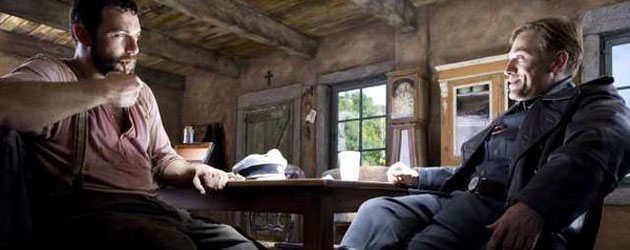David Wasco & Sandy Reynolds-Wasco

AS: What advice would you give to people starting out in the business?
DW: I’d say to get as much formal training as you can and then try to either intern or get an art assistant job where you can be in the middle of an art department and see how it works because it might not be what you really want to do.
SRW: If you’ve got the passion for it then maybe the formal stuff is okay but if you’re going to do four years of film school I think going out and doing the work is better. Even more of a liberal arts background is good, so you have a variety of tools in your belt. You then have literature and philosophy and music and painting. You need all those references to be able to say a night sky is like a Munch painting, or describe a camera angle in a photograph or know that all the lighting in a Civil War period film will be by flame.
DW: In contrast to when we were starting there are just more people trying to get jobs and there are just less jobs. A lot of really good production designers have done theater work and I think that’s always a good route. My friend Carl Sprague the production designer is also a great theater designer.
SRW: Just do it. It’s really about your connections and who you’re meeting and keeping in touch with and broadening those connections.
AS: One thing leads to another…
SRW: Exactly.
DW: You’ve got to use everything. If you know or your family knows somebody, keep the connections alive. When I meet with people I usually like to hand off one or two names for them to contact and then I ask them to get two names from those two people and that ends up being four more people. And you just keep building and building and building the connections and eventually somebody is just going to say, Are you available? Can you just start? The whole process of making movies is also the process of getting work in between movies.
AS: What do you guys like about your jobs?
DW: It’s probably the most unstructured job that you can ask for now. And we get to work together. Sandy gets asked to work on movies all the time independent from me and it’s a choice that I ask her to wait for my next movie, to be working with me, and she honors that. We get to travel together and get paid to do that and we get to meet and be friendly with some very interesting people.
SRW: Every story is different but most importantly every director is different. What they pull out of you is different every time and what you learn in that process is really wonderful. The more demanding they are, the more you learn and grow and go the extra mile. And do things you’ve never done before.
DW: Maybe the harder the movie, the better the movie’s going to turn out.
SRW: It’s only a short period of time, eight months give or take, but it can be life-changing.
Thank you for publishing such a great, in-depth interview with The Wasco’s! – it really captures how wonderful and talented they are, and their love and respect for cinema and architecture. And I really enjoy your blog in general – what a cool resource of ongoing conversations! Keep it up!
Robert Foulkes/Location Manager
I agree with Robert. I’ve read every single one of your interviews and everyone offers such great advice. Inglorious Bastards was such a great film and to hear their story makes it even better. I’m on the distribution and sales side of the business, but my passion has always been designing and art, so to read these stories is truly inspiring.
Thank you!!!